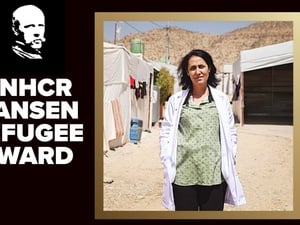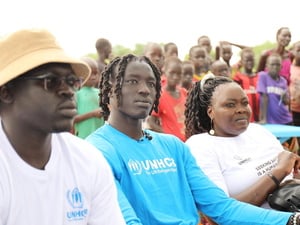Displaced Chadians rush home before rain
Displaced Chadians rush home before rain

A storm looms as loaded trucks carry all the returnees' belongings on difficult, muddy roads.
KOUKOU, Chad, June 6 (UNHCR) - Hundreds of displaced Chadians are racing against time and the elements to return to their villages before the start of seasonal rains.
Some 1,086 internally displaced people (IDPs) have been assisted home on UNHCR-organized trucks from the Dar Sila and Assoungha regions of eastern Chad since the agency started facilitating returns on May 21. Many more are anxious to make the journey as sporadic rains herald the onset of the rainy season that will render roads impassable.
Most of the IDPs originate from eastern Chad's Sila and Ouaddaï regions near the border with Sudan's restive Darfur region. In 2006, the conflict in West Darfur spilled across the border into Chad and fighting erupted between ethnic groups over the use of land and water. Whole communities fled as villages were burnt and crops destroyed. Some 180,000 displaced people found refuge in the Dar Sila and Assoungha regions, where the UN refugee agency and its partners have been working to reduce tensions and promote peaceful co-existence.
The situation improved in early 2010 with the signing of a normalisation agreement between Chad and Sudan and the deployment of a joint border force to ensure security. Encouraged by these developments, an estimated 50,000 IDPs returned to their villages on their own last year.
Since then, nearly 4,500 IDPs in the Koukou area of Dar Sila have asked UNHCR for transport assistance to return home in time to cultivate their fields before the rains start. Assessments found that only about half of their villages were conducive to return in terms of security and the availability of basic social services such as water supply, health care and education. Another 9,000 IDPs in the Farchana area of Ouaddaï are also wishing to return.
A total of 12 return convoys have left eastern Chad for villages such as Borota and Tiero Marena in the last two weeks. UNHCR plans to help as many IDPs as possible to return home in time to start planting activities before the heavy rains start, but the agency is constrained by logistical problems such as a lack of trucks and muddy roads.
The challenges do not end there. One group of IDPs from the village of Chargaya Hashaba said their houses had been completely destroyed by the Janjaweed Arab militia. They returned to nearby Borota, where basic services are available, but will go and cultivate their fields back in their village a short distance away.
"I'm very happy to have returned to my place of origin," said a returnee woman. "After six years of living in uncertainty and temporary shelters, the return to Borota represents for me my own chance to start a new life and build something solid that will last long."
Regardless of whether they returned on UNHCR trucks or on their own, all returning IDPs receive the same assistance. The local authorities give them land to farm and build homes on, while the World Food Programme provides months of food rations and UNHCR provides relief items to help them restart their lives.
"The community appointed a reception committee, they showed us where the wells are and where we could build our houses," said another returnee. "We feel safe and very welcome here. We need tools and seeds to start cultivating our fields."
Stefano Severe, UNHCR's Representative in Chad, noted, "It is good news hearing that all returnees were satisfied with the land allocated to them. This gesture from the local authorities is a good signal and encourages us to continue efforts to provide assistance in areas of return, for instance by reinforcing traditional conflict resolution mechanisms and playing a catalytic role to support the transition towards development."
While many IDPs cannot wait to go home, many others are hesitant and choose to wait and see if conditions improve back home.
Socio-economic conditions are a main challenge for large-scale returns. To promote reintegration, UNHCR is targeting longer-term projects in major areas of return. This involves building shelter, pursuing conflict resolution, promoting human rights and monitoring protection in the villages of return. Aid and development agencies are also working alongside the Chadian government on projects involving water and sanitation, schools and health centres, nutritional follow-up and agriculture.
By Delphine Marie in N'Djamena, Chad









